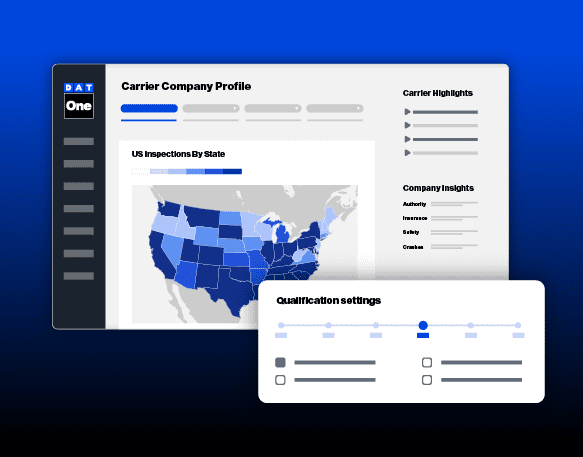Everything You Should Know About Broker-Carrier Agreements
Freight brokers are an essential part of the transportation industry, connecting carriers with shippers that need freight hauled. Because brokers don’t work for either party, they serve as an impartial middleman during these negotiations, ensuring that both sides get a fair agreement that helps their businesses succeed. It’s an exciting and critical role within the freight industry.
While there is a lot that goes into being a freight broker, one of the elements that is particularly important to understand before diving into the role is the broker-carrier agreement. Simply put, anytime a broker makes a connection with a carrier, both parties will need to sign paperwork that outlines the parameters of the deal. Broker-carrier agreements help to ensure that all parties involved are on the same page from the start.
To better understand this paperwork, let’s take a closer look at what makes a broker-carrier agreement effective — and what components are usually included in a complete broker-contract carrier agreement.
What is a broker-carrier agreement?
Broker-carrier agreements (sometimes just called a “carrier agreement” or “carrier-broker agreement”) establish the terms and conditions of the contract between a broker and carrier. As a broker, you’ll need to understand how to establish an effective broker-carrier relationship from the outset using the right documentation.
Here’s how it works: Whenever a trucker wishes to find new freight, a broker is usually involved in setting up the transaction. Brokers generally operate independently, working on commission instead of a predetermined salary. As a result, the quality and quantity of broker-carrier agreements is an important factor in your success as a broker. It also means that you are motivated to get the best possible rate for the freight in question since your payment will likely be determined as a percentage of the final price.
How do brokers find carriers to work with?
Load boards, like the industry-leading DAT load board, are typically the best starting place for brokers looking for carriers to work with. For example, the DAT load board not only gives you access to a searchable database that features more than 500,000 leading transportation companies across North America, but, when paired with DAT CarrierWatch, it also lets you efficiently qualify carriers before you start doing business together.
If anything, that number might seem daunting. But rest assured, DAT helps you narrow your focus. With CarrierWatch you can run customized searches, efficiently review carrier data, and automatically monitor all on-the-job carriers. With this qualifying information at your fingertips, you can be confident about always partnering with the best carriers for your brokerage business.
Load boards aren’t just for brokers, though. Whenever a carrier needs new freight for a vehicle or they want a new broker partnership, they can find them on the DAT load board too, using the DAT Directory to properly vet brokers. Between user reviews, broker credit histories, and data on average days to pay, carriers can find all the qualifying info they need to assess prospective brokers and build relationships that last.
Why is a broker-carrier agreement important?
Ensuring payment is perhaps the most important part of every broker-carrier agreement. Any time a broker-carrier agreement is signed, both parties are agreeing to a specific pay scheme for the carrier’s services. In addition to the pay rate, broker-carrier agreements usually include details about the invoices for the provided service — both how they will be paid and how long they will take to process. A carrier agreement also includes information about the trucker’s (and shipper’s) insurance to ensure any potential damage to the goods is covered.
But finances aren’t the only important element of a broker-carrier agreement. This paperwork is also essential because it lays out key information about the load for carriers including how to pick up the freight, where to transport it, and any additional requirements for the transportation. For specialty carriers, the broker-carrier agreement might include details about temperature monitoring for refrigerated loads or sensitive handling for fragile materials. In essence, the broker-carrier agreement acts as a guide for the carrier and the broker to navigate through their dealings so everyone knows what is expected of them and what they will receive in return ahead of time.
Legally speaking, a broker-carrier agreement is designed to prevent any confusion as to the roles and responsibilities of the carrier, broker, and shipper. The idea behind a broker-carrier agreement is that every time a load is transported, all parties involved agree to a mutually binding agreement ahead of time. In the eyes of the law, this helps to clarify any disagreements that may arise between the carrier, broker, and shipper at any point during the duration of the agreement. By creating a valid contract, the carrier has the opportunity to agree to your conditions and, once they do, it is expected that they will meet all the criteria laid out in the broker-carrier agreement.
What should a broker-carrier agreement include?
There are three main topics that every broker-carrier agreement will cover.
First, the agreement will list the requirements of the job — which services are necessary? How will the shipping/handling process work? Second, the agreement will outline the fiscal components of the job — how much is the carrier getting paid? When will invoices be paid, and how will they be delivered?
Third, the agreement will establish legal protections for both parties involved. In other words, the broker and carrier will both agree that they are qualified to perform the required tasks, that their insurance and abilities are up to snuff, and that they are not misrepresenting themselves in the deal.
In the following broker-carrier agreement template, we will discuss each of the central components of a broker-carrier agreement in further detail — and why each of these components is important. With any broker contract, carrier agreement details can be organized in many different ways. The following is a summary of the most important parts of every carrier agreement, which will help to ensure that a load is delivered safely, legally, and without confusion.
- Basic requirements of the job.
Every broker-carrier agreement must outline the contract’s requirements for both the broker and the carrier. These include the basic legal details of the contract, like the names of each party involved. The document will require both the carrier’s personal name and the name of their business, as well as your personal name and the name of your business. Another basic detail included in the carrier broker agreement is the carrier’s professional documentation, such as their MC number, DOT number, and license plate number.
In addition to documenting the basic details of your parties, the broker-carrier agreement typically includes multiple other stipulations. These may include the length of the contract and any requirements for ending the contract early. This part of the agreement will also include the scope of the carrier’s job.
Another essential element that falls under the category of basics is the Bill of Lading, the section of the carrier-broker agreement that explicitly outlines the specifications of the goods in the load. The agreement then covers scope, which includes the expected schedule and route that the carrier will take, as well as any necessary dimensions and measurements listed in the Bill of Lading. Any other instructions in the transportation job (loading/unloading, who and where to deliver) will also be detailed here.
One final note on the basic requirements: As a broker, it’s always important to include a clause in this part of the carrier agreement that prohibits subcontracting. This prevents your carrier from hiring out an unauthorized trucker to carry out part or all of the trip.
- Fiscal components of the job.
The broker-carrier agreement acts as an important tool for detailing how the carrier and broker are paid. Rather than negotiating costs after delivery, brokers can set the conditions of payment upfront. This part of the broker-carrier agreement is a great place to specify how much the carrier will be paid for the job, when the carrier will be paid, and how the invoice will be delivered.
To avoid underpayment, carriers will be able to list their payment rates in the broker-carrier agreement — and specifically include any additional costs associated with their job. In this section of the agreement, the carrier and broker will decide whether the carrier will be responsible for any additional costs, like fastening straps and additional laborers, that may be needed to complete the job or if the shipper will cover these costs.
- Legal protections of the contract.
There are plenty of things that can go wrong when freight is transported over long distances. Broker-carrier agreements include protections against legal damages for both parties to avoid any legal conflicts later on as a result of these potential issues.
This is the part of the contract where the broker should include the requirements for carrier insurance. Insurance requirements can vary from broker to broker, but most brokers require at least legal liability insurance and workers’ comp. More legal protections, like indemnification and carrier liability, are important to include in the contract. These clauses allow you to protect the broker from legal liability if any cargo is damaged or missing by delivery. DAT and Loadsure have partnered to provide cost-effective insurance on a per-load basis.
As a final legal precaution, your broker-carrier agreement should include a Conflicts of Law section to specifically detail what course of action must be taken if one of the parties believes there has been a breach of contract.
While a broker-carrier agreement, like most contracts, can come in many formats, this broker-carrier agreement template is a good place to start in constructing your own framework. It’s important to remember that these three categories contain the information necessary for an effective agreement, but it is up to you to decide how to write up your contract. When it’s time to format a contract, it is common to list several dozen narrow topics — for example insurance requirements, indemnification clause, subcontracting prohibition clause — until each necessary clause is met to ensure that you don’t miss any key components. Finally, your contract should end with a summary or outline of the agreement to ensure everyone is on the same page.
Become a freight broker with DAT Broker TMS
Becoming a freight broker is a rewarding experience, but, as you can tell, it can be complicated, especially when you’re first getting started. With freight brokers in demand, you will need to understand how to find the right carriers and set up effective broker-carrier agreements from the get-go. That’s where DAT comes in.
DAT Broker TMS offers a complete transportation management solution for freight brokers, so you can manage your entire business from one dashboard. For a flat monthly fee, you can manage invoices, view your finances, and document all your carrier agreements in one place.
At DAT, our transportation management solutions provide user-friendly services for long-term growth. DAT offers a way for carriers to grow their business, too. With DAT Authority, carriers can get their operating authority with ease so they can begin establishing quality broker-carrier relationships and finding reliable shipping partners. Whatever role you play in the trucking industry, DAT is here to help you build your business, and to run it more efficiently than ever.
Start your freight brokerage today!
Becoming a freight broker is a great way to get involved in the trucking industry, but getting authority on your own can be tough. Luckily, the experts at DAT Authority are here to help. They will guide you through the entire process to ensure you get your authority as easily and quickly as possible so you can start building your business. Get started with DAT Authority today!




